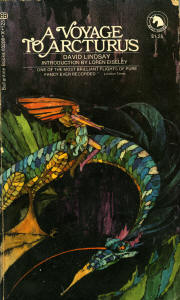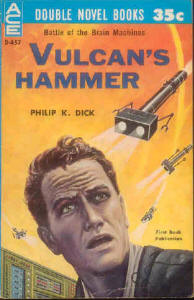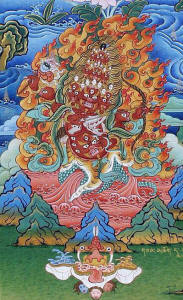|
A VOYAGE TO ARCTURUS |
|
INTRODUCTION BY LOREN EISELEY A Voyage to Arcturus is, in reality, a long earth journey. So interpreted it is a tale of travels that few among us possess the imagination, the courage, or the ever-present symbolism to sustain. The book is an amalgam of strange philosophies clothed in weird exterior forms that have taken shape in a fantastically gifted if somewhat elusive mind. As one of his Arcturian characters remarks of a haunting and formidable music which it is the aim of the hero to investigate: "The man that can play the instrument ... would be able to conjure up the most astonishing forms, which are not phantasms, but realities." David Lindsay, the author of A Voyage to Arcturus, comes very close to being such a musician. In spite of a prose which is occasionally rude and awkward, in spite of characters which appear and vanish before, in some instances, we can quite grasp their significance, in spite of a plethora of overdramatic names like Maskull and Nightspore, Lindsay has produced a book which it is difficult if not impossible to lay down once one has entered the observatory tower where the journey starts and glimpsed the dread blue sun which revolves by far-off Tormance. David Lindsay died young. One must be tolerant, therefore, if his message -- even his unearthly music -- is rasped from a not quite perfected instrument or if his compositions seem too complex for our ears. The importance of this young forgotten writer lies in the fact that his book has refused to die and that it has occupied the libraries of bibliophiles and received the devoted attention of such gifted men as Frank Lloyd Wright. The book, to hold such attention, must contain some message from the world of Nightspore, from the soul beyond death. [AB-1] The message is cryptic, admittedly. If, however, one reads, not lightly, but again and yet again, one is conscious of an always shifting point of view which is a true part of the fragmented world we occupy. The messages derived from the fragments cannot be the message from the whole. Even Maskull, the seeker, collapses before the labyrinthine thought which permeates Lindsay's conclusion. To it I will return, but first I wish to establish the reality of this Arcturian landscape and equate it with the things on earth. I do so for one purpose only: that we do not mistake Arcturus, in this day of easy science fiction, for a superficial tale of odd beings with odd organs on a planet remote from our own. This is not a common story of adventure. Rather, it is a story of the most dangerous journey in the world, the journey into the self and beyond the self. Let me illustrate. A few days ago on a West Indian island I walked at low tide through the wet sand and coral which afforded the background of half a dozen living worlds. I thought, as I waded through this weird and glimmering domain of life, of a remark that the philosopher George Santayana had made long ago. "Prodigious complexity," he had observed, "is something to which nature is not averse, like a human artist, but on the contrary is positively prone." A jellyfish, ninety-five per cent water yet somehow alive, pumped past me, stoutly working its little translucent umbrella -- although it could neither hear nor see its way and was about to be dashed into oblivion upon the shore. Down in the weeds, his appropriated shell festooned with all manner of concealing bric-a-brac, lurked a hermit crab. Something unindentifiable with mottled green tentacles grasped at my sandals. In another spot a slippery proboscis just protruding from the sand descended faster than I could uncover it. Farther along a great tiger-colored slug whose pseudo-eyes gave it the expression of a formidable fish, grazed amidst the bottom plants. Once a bright blue butterfly object hovered in the water and, as I tried to grasp it, vanished with a total magical directness that was inexpressibly startling. I disturbed a delicate pale-blue shrimp hiding in the mouth of an anemone with stinging nettles. I encountered a sidling crab concealed behind claws which had been modeled to fit over his entire face like a medieval helmet; he could only momentarily be persuaded to drop this enormous guard. Just his eyes were alive, twiddling like small twin periscopes above his armor. It became obvious as I studied him that he was engaged in some effort at total disinvolvement with the world. Now if I had chosen to walk through these tide pools with the mind and thirsty imagination of a David Lindsay I believe it would have been possible, even without the twin suns of Branchspell and Alppain, to have observed the whims of the country of Matterplay, and if I had been able, like Lindsay, to humanize and make articulate this fantastic and diverse array, its voices would have been equally dissembling in expressing their interpretations of the universe. The double-sexed would have spoken their views of life, as would the blind from the deep caves of the coral. The multiple-personed Portuguese man-of-war might have had a philosophy, or the starfish some radial pure delight unknown to creatures of mere bilateral symmetry. In a similar and equally bewildered fashion Maskull, who is really a kind of symbolic Everyman, journeys through the wilds of the Arcturian planet Tormance, seeking from its strange inhabitants the meaning of the universe, some word of its creator. He follows a mysterious drum beat, which, toward the end of the story, we come to suspect is the exteriorized music of his own beating heart. [AB-2] He encounters beings who speak of their god as of this nature: "He faces Nothingness in all directions. He has no back and no sides, but is all face; and this face is his shape. It must necessarily be so, for nothing else can exist between him and nothingness ... He draws his inspirations from it; in no other way could he feel himself ..." Each man, continues the speaker, is a miniature of this same god. But God, before the end, is seen or hunted in many shifting guises. Is he Crystalman, or Shaping, who seems at first benign but whose subjects in the instant of death all break into a hideous grin as though taken with some final repulsive joke? There is a Bergsonian glimpse of life as some kind of ineffable streaming radiance, an elan vital caught and trapped and diversified in matter and forever seeking escape from it. There is the beautiful moment toward the end in which the dying Maskull recognizes he has set himself against the infinite, that he is nothing and that the final extirpation of his will has left him free. Yet it is characteristic of Lindsay's work that we are not permitted to rest upon this note. Maskull, who had glimpsed the life around him in so many shapes -- even, with concentrated gaze, seen a living body dissolved until it was only a dance of blood corpuscles through invisible arteries, a ghostly starlike fountain hidden beneath a grotesque exterior shell -- Maskull in his spiritual shape of Nightspore had still a last dread journey into that tower of death before whose entrance he protests in vain to the ferryman: "I have forgotten everything." Some moments later when he emerges hopeless from the tower to re-enter life again, we are not sure whether his decision is foredoomed and inescapable or an act of free will. We know only that amidst the stench and diversions of matter a tremendous spiritual struggle is in progress. Yet haunting our ears also throughout the book is the utterance of Maskull's mysterious supernatural companion: "The music was not playing for you, my friend." Or, again, there is Nightspore's protest over the body of Maskull: "Why was all this necessary?" If, as readers, we expect from David Lindsay a clear answer to this age-old question we shall be disappointed. Instead, if we are perceptive, we shall have climbed with Nightspore that last grim tower in the night and returned with some kind of unearthly knowledge which it is not in our power to communicate adequately. In the end one arises from this book not as from an idle tale, but from a spiritual catharsis the more surprising because it will have been transmitted, like the music of the drum that Maskull followed, dimly and from far away. David Lindsay was perhaps too honest to record one voice alone among the many conflicting voices that represent the living world. It is both his strength and his weakness that certain of the questions asked on Tormance, as well as the responses to them, are locked in that Delphic ambiguity which torments our daily lives. The intellectual contribution of A Voyage to Arcturus lies in its author's willingness to ask such questions. In a highly original and vivid manner and to pursue them to the inevitable, if ennobling, end. _______________ American Buddha Librarian's Comment: [AB-1] Yeah? And so has Plato, Neitzsche and Hitler. This is the lamest piece of apologetic writing for fascism you have ever done, Loren. Did someone threaten your wife and children if you didn't write it? [AB-2] Yes, and no. It's the hammer of Vulcan, pounding on your heart. It's the drumbeat of the "Protectors," those beings who OWN you! I guess you had to be a Tibetan Buddhist to understand this shit. It's ancient, magical philosophy. And in no way, original. H. E. Shenphen Rinpoche, "The Protectors" wrote: Along with the liquid that you offer in the dharmapala cup, you should also offer beef heart. The dharmapala offering is a symbol of activating the heart core. The chanting and beating of the drum that we do in the dharmapala practice vibrates the Buddha's heart. From that heart vibration, our heart vibrates. So they vibrate together, which produces the energy that produces the different phenomena. The reason it is so hard to relate to the teaching of the dharmapalas is because this teaching is so very, very sophisticated. When you go through all the elaboration of the practice, through all the blood, guts, pus and everything spilling out, and you look at the various vapors that rise up, then you begin to understand. Understanding the dharmapala is really understanding how your blood and your heart beat relate to your practice. We say your heart is the drum of the dharmapala. The pumping of the blood is the offering to the protectors, and the beating of the heart is their drum.
For example, once, in His Holiness' temple, a man named
Pedma Longdu used to beat the dharmapala drum every evening and make
offerings. He had made a commitment to His Holiness to perform this
offering ritual, and it was his routine. One night he got drunk and
didn't make the offering. He went to sleep. In the middle of the night
my mother woke up, maybe around 2:00 a.m., when the dharmapala drum
began beating on its own. She woke up my father and asked him, "Did you
ask for a special extension of the practice? What is going on?" Rinpoche
just got up and smiled, and said, "It doesn't matter. No, it doesn't
matter."
|


